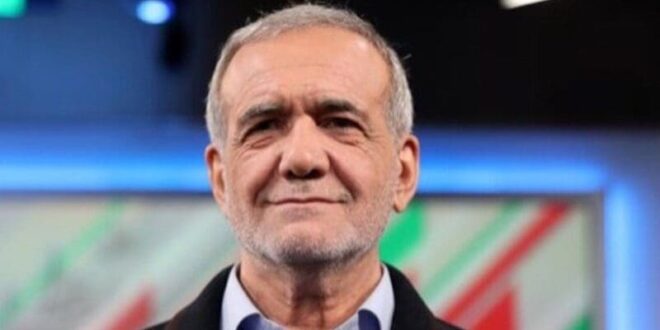In a significant turn of events, reformist candidate Masoud Pezeshkian has emerged victorious in Iran’s presidential election, defeating his hard-line rival, Saeed Jalili. The results were announced after Pezeshkian secured 53.3 percent of the more than 30 million votes counted, compared with Jalili’s 44.3 percent. This pivotal vote comes at a critical juncture marked by heightened tensions both domestically and internationally. Does the election outcome have far-reaching implications for Iran’s internal political landscape, as well as its foreign policy and relations with the global community?
First, it is essential to highlight that the voter turnout was 49.8 percent, which is historically low. The low turnout reflects several underlying issues, such as widespread public dissatisfaction with the economic situation and political process, potential disenchantment with the candidates, and perhaps a broader sense of apathy or disillusionment.
Pezeshkian has navigated two distinct career paths in medicine and politics. As an Iranian heart surgeon of Azerbaijani and Kurdish heritage, he was actively involved in the 1980-1988 Iran-Iraq war, not only sending medical teams to the front lines, but also serving as a combatant and physician. After the conflict, he furthered his medical studies, focusing on general surgery at Tabriz University of Medical Sciences, and obtaining a subspecialty in cardiac surgery from Iran University of Medical Sciences in 1993. His surgical expertise led to his appointment as president of Tabriz University of Medical Sciences in 1994, a role he held for five years.
In 1994, a car accident resulted in the tragic loss of his wife, Fatemeh Majidi, and one of his daughters. In 1997, Pezeshkian transitioned into politics by joining Mohammed Khatami’s administration as deputy health minister. He was promoted to health minister in 2001, a position he held until 2005. Since then, he has been a significant figure in the Iranian parliament, representing Tabriz for five terms, and serving as the first deputy speaker from 2016 to 2020.
Pezeshkian is often categorized as a reformist or moderate within Iran’s political landscape for several compelling reasons. Similar to former presidents Mohammad Khatami and Hassan Rouhani, he stands for fostering improved relations with Western nations, notably the US. His advocacy for stronger diplomatic ties is rooted in the belief that such relations could lead to the lifting of sanctions, bolstered trade opportunities, economic enhancement and, ultimately, a stronger Islamic Republic.
Moreover, Pezeshkian has not shied away from criticizing the Iranian government, particularly regarding its handling of protests. He has voiced concern over the authorities’ stringent measures against demonstrators, particularly highlighting issues surrounding women’s rights and the enforcement of the hijab rule. He said: “We will respect the hijab law, but there should never be any intrusive or inhumane behavior toward women.”
Nevertheless, it is important to point out that Pezeshkian has consistently shown strong support for the Islamic Revolutionary Guard Corps, criticizing the US for designating it as a terrorist organization. His past public display of wearing the IRGC uniform in parliament further underscores his alignment with this stance.
In addition, his approval by the Guardian Council to run for the presidency and his sustained career in Iranian politics indicate his loyalty to Supreme Leader Ayatollah Ali Khamenei and the foundational revolutionary principles of the Islamic Republic. Pezeshkian appears to be advocating for policies such as improving Western relations not as a challenge to the system, but as a means of enhancing its resilience and effectiveness. Like other figures considered moderates or reformists, he seeks to strengthen the Islamic Republic through different strategies, while maintaining its core principles.
The international community should temper its expectations regarding Pezeshkian’s potential to bring about fundamental changes in Iran. The reality is that the country’s domestic and foreign policies are primarily controlled by the supreme leader and the senior leadership of the IRGC. These entities wield significant authority, often overshadowing efforts by reform-minded figures, such as Khatami, in the past. History has demonstrated that even those labeled as reformists have been constrained by the overarching influence of the supreme leader and the IRGC, whose decisions hold sway in Iranian governance and strategic direction. Thus, while individuals such as Pezeshkian may advocate for certain reforms or policies, their ability to enact substantial change remains limited.
In other words, Iran’s stance on regional policies, support for proxies, and approach to nuclear and ballistic missile programs are unlikely to change. Historically, when a so-called reformist assumes office, it often triggers a reactionary response from hard-liners who intensify crackdowns domestically. This serves as a clear signal to Iranian society that despite any electoral changes, the hard-liners maintain authority and control. Thus, while there may be shifts in rhetoric or emphasis, particularly on issues such as domestic reform or international relations, the core strategies and policies of Iran are typically upheld by the entrenched hard-line power structures within the country.
In conclusion, while Pezeshkian’s victory as a reformist or moderate may signal potential for nuanced policy approaches, particularly in diplomacy with the West and criticisms of domestic governance, it remains clear that fundamental shifts in Iran’s core policies — such as regional strategies, support for proxies, and nuclear ambitions — are unlikely under the prevailing influence of the supreme leader and the IRGC.
This continuity suggests that while Pezeshkian and others may advocate for change, the entrenched power structures within Iran will continue to shape the country’s direction, maintaining stability according to their established principles. In addition, the low voter turnout underscores broader public disillusionment and raises questions about the election’s legitimacy. Thus, while the election outcome may appear to introduce new dynamics, it underscores the enduring dominance of Iran’s conservative elements in determining its trajectory, both domestically and on the global stage.
 Eurasia Press & News
Eurasia Press & News




